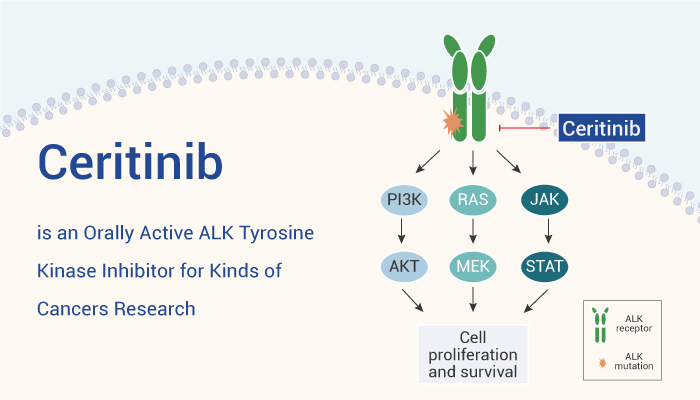Anaplastic lymphoma kinase (ALK) is a receptor tyrosine kinase belonging to the insulin receptor superfamily. Besides, the pathogenesis of various cancers is closely related to the abnormal form or expression of ALK. Moreover, ALK activates multiple pathways, including phospholipase C, which affects cell growth γ, JAK-STAT, PI3K-AKT, mTOR, SMO-GLI, and MAPK signal cascades. Furthermore, ALK is usually expressed during the development of the nervous system. Research has shown that ALK is expressed in multiple regions of the hippocampus in mice, including the dentate gyrus, angular gyrus (CA) 1 region, and CA3 region. Meanwhile, ALK may also undergo carcinogenic changes in various malignant tumors, including NSCLC and anaplastic large cell lymphoma (ALCL). The presence of ALK fusion protein and constitutive ALK tyrosine kinase activity represent therapeutic targets for all ALK rearranged malignant tumors. Now, we will introduce an orally bioavailable ALK tyrosine kinase inhibitor, Ceritinib (LDK378).
Ceritinib is an Orally Active ALK Tyrosine Kinase Inhibitor for Kinds of Cancers Research.
First of all, Ceritinib (LDK378) is a selective, and ATP-competitive ALK inhibitor with an IC50 of 200 pM. Nonetheless, Ceritinibalso inhibits IGF-1R, InsR, and STK22D with IC50 values of 8, 7 and 23 nM, respectively. Importantly, Ceritinib (LDK378) shows great antitumor potency.
In the second place, Ceritinib has an excellent pharmacokinetics profile in rodents and non-rodents with an oral bioavailability of >50%. Particularly, Ceritinib demonstrates dose-dependent tumor growth inhibition in the Karpas 299 rat xenograft model. Obviously, Ceritinib achieves complete tumor regression in the H2228 NSCLC rat xenograft model, which carries the EML4-ALK fusion gene.
All in all, Ceritinib is an orally active ALK tyrosine kinase inhibitor for kinds of cancers research.
References:
[1] Chen J, et al. J Med Chem. 2013 Jul 25;56(14):5673-4.
